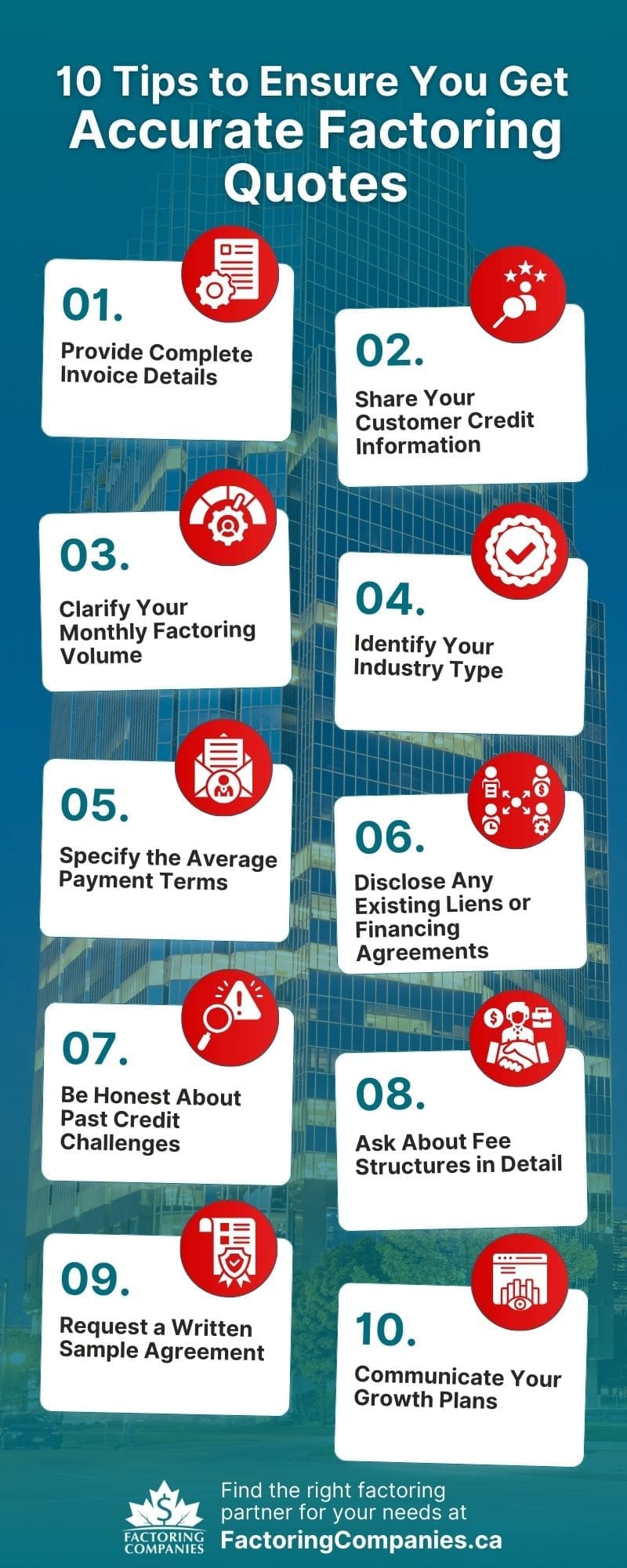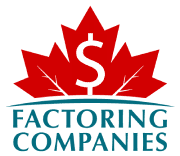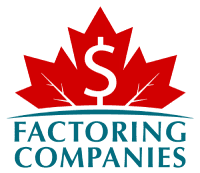
Have you ever built an order on Uber Eats, only to find that the final price was not what you expected at all? Or, maybe switched phone companies, only to discover that what you thought was standard is an add-on? These things aren’t always dealbreakers, but you certainly want to know about them beforehand so that you can make an informed decision.
A similar situation can occur with invoice factoring. More often than not, it’s just because each factoring company structures fees in a unique way. To get accurate factoring quotes, you need to be prepared to provide specific information and ask the right questions. We’ll walk you how to do just that below.
1. Provide Complete Invoice Details

When you request a factoring quote, the accuracy of the offer you receive depends heavily on the quality of the information you provide. Factoring companies base their rates and terms on the strength of your receivables, so any missing or vague details create uncertainty that typically drives up costs. At a minimum, you should be ready to share:
- Invoice Amounts: Be clear about the typical size of your invoices. If your business often issues invoices around five thousand dollars but occasionally bills larger amounts, it helps to share that pattern. Larger invoices may qualify for better rates because they are more cost-effective to manage. Without this information, a factor may assume your portfolio is riskier than it actually is.
- Invoice Dates and Payment Terms: Always include the date the invoice was issued and when payment is due. The difference between a 30-day term and a 90-day term significantly impacts the factor’s risk, which is reflected directly in the rate you are quoted. If this information is missing, you may be quoted a higher price to account for the unknowns.
- Customer Information: Let the factoring company know who your customers are. Factors advance money based largely on your customers’ reliability to pay. Strong customer accounts often lead to better terms, but if the factor has no insight into who owes the money, they have no choice but to assume greater risk in their pricing.
2. Share Your Customer Credit Information
Factoring companies make decisions based heavily on the credit strength of your customers. When you apply for a quote, providing customer credit information helps the factor accurately assess risk and offer terms that reflect the true quality of your receivables.
You do not need to provide full credit reports at the quoting stage, but offering basic insights can make a real difference. Helpful details include:
- Customer Credit Ratings: If your customers are large corporations or government agencies, mentioning this upfront can help you qualify for lower factoring rates. These entities tend to have strong credit and predictable payment behaviours, which reduces the factor’s risk.
- Payment Histories: Letting the factoring company know if your customers have a history of paying invoices on time, within a consistent range like thirty to forty-five days, can improve your quote. If you have records showing minimal late payments or disputes, even better.
- Concentration Information: If a significant portion of your receivables comes from one or two customers, you will want to disclose this early. High customer concentration can sometimes increase risk, but when the customers involved are financially strong, it can work in your favour. For example, factoring invoices from a major retailer or a Crown corporation tends to be viewed positively, even if those clients represent a large share of your revenue.
3. Clarify Your Monthly Factoring Volume
When you request a factoring quote, the factoring company will want to understand how much you plan to factor each month. Your expected volume plays a direct role in how your rates and terms are structured.
Most factoring companies offer volume-based pricing. The more receivables you factor, the lower your rate may be, because higher volume helps offset the administrative and risk management costs. Without knowing your volume, the factor is forced to quote based on small-ticket assumptions, which generally leads to higher pricing. To give the factoring company a clear picture, you should be prepared to share:
- Average Monthly Invoice Value: Let them know approximately how much you invoice each month. Even a range, such as eighty thousand dollars to one hundred thousand dollars, provides enough clarity to price appropriately.
- Expected Factoring Volume: Be honest about how much of your monthly invoicing you plan to factor. Some businesses factor all invoices, while others only factor select accounts. If you are planning to factor only half your receivables, for example, mention it upfront.
- Seasonal Fluctuations: If your business has seasonal spikes or slow periods, such as construction firms in Ontario that see heavier invoicing during spring and summer, include that information. A predictable fluctuation is often easier for the factoring company to accommodate than a sudden, unexplained drop in volume.
4. Identify Your Industry Type
Your industry plays a significant role in how factoring companies assess risk and set pricing. Different industries have different payment patterns, customer behaviours, and levels of risk, and factoring companies take all of that into account when preparing your quote. When you are seeking a quote, you should clearly state:
- Your Primary Industry: Let the factoring company know if you are in transportation, staffing, manufacturing, construction, or another sector. Certain industries, like trucking or staffing, are well understood in factoring and often have standard pricing models that reflect lower administrative risk.
- The Nature of Your Customers: Sharing who you typically invoice can help the factoring company gauge risk more accurately. For example, a transportation company invoicing large, established shippers will usually receive better terms than one working mainly with small start-ups.
- Contract Structures or Milestone Billing: If your invoices are tied to specific deliverables, like stages of a construction project, mention this early. Progress billing can introduce different risk considerations than straightforward product shipments or time-based services.
5. Specify the Average Payment Terms
Factoring companies need to know how long your customers typically take to pay their invoices. The longer a factor has to wait for payment, the more risk and cost they take on, which directly affects the quote you receive. When you provide this information, be specific:
- Standard Payment Terms: Let the factoring company know if your invoices are usually due in thirty, sixty, or ninety days. Payment terms of thirty days are considered standard in many industries and usually come with more competitive factoring rates. In contrast, terms of ninety days introduce more uncertainty and generally result in slightly higher fees.
- Actual Payment Behaviour: If your customers consistently pay on time, mention it. If your customers often take a few extra days but generally stay within a predictable range, that is worth noting as well. For example, in industries like manufacturing, it is common for customers to slightly stretch payment terms, but consistent patterns are easier for factoring companies to accommodate than erratic ones.
- Early Payment Incentives: If you offer discounts for early payments, and customers often take advantage of them, share that information. Strong payment incentives can reduce the average collection period, which may improve your pricing.
6. Disclose Any Existing Liens or Financing Agreements
Factoring companies need to know if there are any existing claims on your receivables before they can accurately quote you. If another lender has already secured rights to your invoices, it can complicate or even prevent the factoring process. When you are preparing for a factoring quote, make sure to disclose:
- Current Lenders or Secured Financing: If you have a bank loan, a line of credit, or any form of secured financing that uses your accounts receivable as collateral, share that information immediately. Factoring companies must verify that they can establish a first-position security interest, and undisclosed liens can delay or derail approvals.
- Government Liens: If your business has tax liens from agencies like the Canada Revenue Agency (CRA), disclose this during initial discussions. Some factoring companies can work around certain types of government liens, but it often requires additional steps and affects pricing.
- Supplier or Trade Creditor Agreements: Occasionally, supplier agreements may include security interests in your receivables. While less common, these should also be mentioned if they exist.
7. Be Honest About Past Credit Challenges
When applying for a factoring quote, honesty about your business’s financial history is essential. Factoring companies perform their own due diligence, and undisclosed issues almost always surface during the underwriting process. Addressing them up front helps you control the narrative and gives the factor the chance to work with you, rather than react to surprises. Important details to share include:
- Previous Bankruptcies: If your business has ever filed for bankruptcy, let the factoring company know early. While a past bankruptcy does not automatically disqualify you, it does influence how the factor structures risk and pricing. Some factors are willing to work with businesses that have re-established good financial practices after bankruptcy, especially if customer receivables are strong.
- Outstanding Judgments or Collections: If there are existing judgments, lawsuits, or collection actions against your business, disclose them. These could affect the factor’s ability to collect payments if issues arise and will need to be evaluated as part of the risk review.
- Tax Issues or CRA Arrears: If you owe back taxes, including GST or payroll taxes, let the factoring company know. Certain types of arrears, particularly those with structured repayment plans, can sometimes be accommodated if they are disclosed early.
8. Ask About Fee Structures in Detail

Factoring fees can vary widely depending on the agreement’s structure, so it’s essential to understand exactly what is included in the quote you receive. Some factoring companies present very simple fee structures, while others include multiple charges that can significantly increase the total cost. When you are reviewing a quote, ask about:
- Discount Fees: This is the main fee that covers the cost of factoring. It is typically expressed as a flat amount charged on the invoice value for a set period, such as thirty days. Clarify how the discount fee is calculated and when it is applied.
- Reserve Accounts: Some factors hold back a percentage of the invoice value as a reserve in case of non-payment or adjustments. Confirm whether the reserve is required, how much it will be, and when funds will be released.
- Credit Protection Fees: If the factoring company offers non-recourse factoring, meaning they take on the risk of customer non-payment, there may be additional fees. Make sure you understand if the quote assumes recourse or non-recourse terms.
- Monthly Minimums or Administrative Fees: Some contracts include minimum monthly volume requirements or separate charges for services like credit checks, wire transfers, or account maintenance. These should be disclosed clearly at the quoting stage to avoid unexpected costs.
9. Request a Written Sample Agreement
Before committing to a factoring company, it’s important to review the actual terms you will be asked to sign. A written sample agreement provides a comprehensive view of the factoring relationship, going beyond what is covered in the quote. When you request a sample agreement, pay attention to:
- Fee Details: Confirm that all fees discussed during quoting are reflected accurately in the agreement. Look for any additional charges that were not mentioned, such as credit check fees, early termination penalties, or invoice verification charges.
- Termination Terms: Review the duration of the agreement and what is required to terminate the relationship. Some contracts are month-to-month, while others require a longer commitment. Understanding this up front prevents complications if your business needs change.
- Customer Interaction Policies: Some factoring companies contact your customers directly as part of the collections process. Clarify how customer communications are handled and whether your customers will be informed that you are factoring invoices.
- Reserve Account Terms: If a reserve account is required, check when funds are released and under what conditions deductions may occur.
10. Communicate Your Growth Plans
Factoring companies look not only at where your business is today but also at where it is headed. Sharing your growth plans during the quoting process helps ensure you receive a facility that can scale with your needs, rather than one that becomes restrictive too quickly. When discussing growth, consider mentioning:
- Expected Increases in Revenue: If you anticipate a surge in sales due to new contracts, expanded marketing efforts, or seasonal factors, let the factoring company know. Growing businesses often qualify for more flexible lines of credit, but the factor needs to plan for larger invoice volumes and higher funding requests.
- Customer Base Expansion: If you’re onboarding new customers, especially larger or more established ones, be sure to mention it. A stronger customer mix can improve the quality of your receivables and support better factoring terms.
- Operational Changes: If you’re expanding into new provinces, launching new services, or opening additional locations, it’s helpful to explain how these changes will affect your invoicing and cash flow needs.
Put Your Knowledge into Action with a Complimentary Factoring Quote
Our invoice factoring calculator can help you ballpark your costs, but in order to get a more accurate factoring quote, you’ll need to share additional details like those covered above to get the full picture. To get started, request a complimentary factoring quote.
FAQs on Accurate Factoring Quotes
Do factoring companies require customer credit information before quoting?
While some factoring companies may offer a general quote based on limited information, providing customer credit details leads to a more precise and reliable offer. Knowing your customers' credit strength helps the factoring company calculate risk and may allow you to qualify for better rates and terms.
How does my monthly factoring volume affect the quote I receive?
Factoring companies often offer volume-based pricing. Businesses factoring larger amounts each month usually qualify for lower rates because administrative costs are spread across more receivables. Sharing realistic monthly volume estimates ensures your quote matches your expected activity and helps avoid pricing changes later in the process.
Why do factoring companies ask about my industry when providing a quote?
Different industries carry different payment risks. For example, transportation and staffing are well-known sectors with predictable patterns, while niche industries may need more review. Letting the factoring company know your industry up front allows them to offer pricing based on familiar risk models, improving accuracy and approval speed.
Does the average payment term on my invoices impact my factoring quote?
Yes, it does. Shorter payment terms, like thirty days, typically lead to better factoring rates because the risk window is smaller. Longer terms, like ninety days, increase the time the factoring company waits for payment and usually result in higher fees to account for the extended exposure.
Will having an existing lien affect my factoring quote?
An existing lien on your receivables can complicate the factoring process. Factoring companies need to secure a first-position interest to fund your invoices. Disclosing liens early helps the factor evaluate the situation properly and may allow them to structure a solution without surprises or delays in final pricing.
Should I disclose past financial issues when asking for a factoring quote?
Yes. Being honest about past bankruptcies, judgments, or tax arrears gives the factoring company a complete view of your risk profile. Many factoring companies are flexible, but they rely on transparency. Disclosing issues early helps avoid price changes later and keeps the process moving smoothly toward approval.
What hidden fees should I ask about when reviewing a factoring quote?
Ask about reserve requirements, credit protection fees, administrative charges, and early termination penalties. Some factoring quotes focus only on the discount rate without disclosing all costs. Reviewing the full fee structure ensures you understand the real cost of factoring and can fairly compare offers from different providers.
Is it important to review a sample agreement before accepting a factoring quote?
Reviewing a sample agreement is essential. It shows how fees are applied, how reserves are managed, and what customer communication policies exist. A clear agreement helps you avoid hidden terms and ensures that the offer you are accepting matches what was promised during the quoting process.
How can my business growth plans influence the factoring rates I am quoted?
If your business is expanding, communicating growth plans early can help you negotiate better terms. Factoring companies appreciate businesses that plan ahead because it allows them to scale the facility properly. Growth projections can support more flexible limits, faster approvals, and rates that adjust as your needs evolve.

About Factoring Companies Canada
Related Insights
Get an instant factoring estimate
Factoring results estimation is based on the total dollar value of your invoices.
The actual rates may differ.
CLAIM YOUR FREE FACTORING QUOTE TODAY!
PREFER TO TALK?
You can reach us at
1-866-477-1778
Get an instant factoring estimate
Factoring results estimation is based on the total dollar value of your invoices.
The actual rates may differ.
CLAIM YOUR FREE FACTORING QUOTE TODAY!
PREFER TO TALK? You can reach us at 1-866-477-1778











